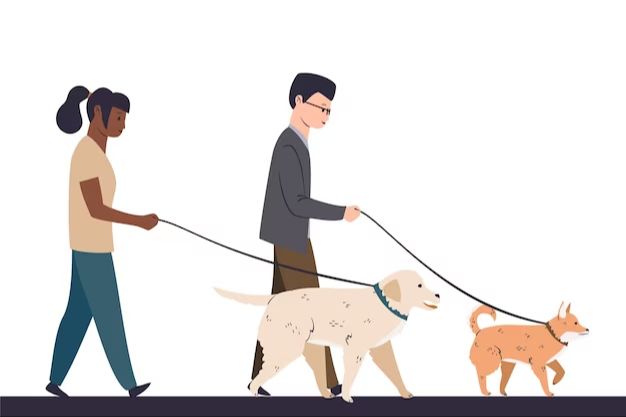Intro
A sentence is a group of words that expresses a complete thought. Sentences are made up of a subject and a predicate. The subject is the person, place, or thing being talked about in the sentence. The predicate describes what the subject is doing or contains information about the subject. Sentences express a complete thought and contain a subject and a verb.
This content will examine different types of sentences and how to properly use the word “dog” in them. We will look at simple, compound, and complex sentences as well as sentence fragments and common phrases using “dog.” Descriptive, interrogative, and exclamatory sentences using “dog” will also be discussed. Proper sentence structure and grammar will be emphasized throughout each section.
Simple Sentences
A simple sentence contains a subject and a verb and expresses a complete thought. Here are some examples of simple sentences using the word “dog”:
My dog ran across the yard.
The stray dog begged for food.
The dog barked at the noise.
My sister’s new puppy is a dog.
The happy dog wagged its tail.
As you can see, these simple sentences express a complete thought using the subject, the verb, and the object. Using simple sentences is a clear way to incorporate the word “dog” into a sentence.
Compound Sentences
A compound sentence contains two or more independent clauses joined by a coordinating conjunction such as “and”, “or”, or “but”. Here are some examples of compound sentences using the word “dog”:

The dog ran through the yard, and he jumped into the kiddie pool to cool off.
We took our dog to the park, but he was more interested in chasing squirrels than playing fetch.
I bought a new collar for my dog, or I may get him a cute new bandana instead.
As you can see, compound sentences allow you to express two complete thoughts in one sentence. The coordinating conjunction connects the independent clauses and indicates their relationship. Using “and” joins the ideas, “but” contrasts them, and “or” provides an alternative.
Complex Sentences
A complex sentence contains an independent clause and at least one dependent clause. The dependent clause does not express a complete thought and cannot stand alone as a sentence. Here are some examples of complex sentences using the word “dog”:
Although the dog was tired, he still happily chased after the ball when I threw it.
In this sentence, “Although the dog was tired” is a dependent clause that cannot stand alone. It adds additional description but does not express a complete thought.
Before going to bed, I made sure to let the dog out one last time.
Here “Before going to bed” is the dependent clause, while “I made sure to let the dog out one last time” is the independent clause that could stand alone.
Until we adopt a dog from the shelter, the children will continue asking for a puppy every day.
“Until we adopt a dog from the shelter” is the dependent clause that gives more context to the independent clause that follows.
Complex sentences allow us to combine multiple ideas and add details and description to our sentences using dependent clauses.
Sentence Fragments
A sentence fragment is a phrase that is missing a subject or verb to be a complete sentence. Here are some examples of sentence fragments using the word “dog” and explanations for why they are incomplete thoughts:
Chasing after the neighbor’s cat. This fragment is missing a subject. We don’t know who or what was chasing the cat.
When I opened the door. This fragment is missing the main verb and object. We don’t know what happened when the door was opened.
In the park, playing with a ball. This sentence is missing a subject. We don’t know who was in the park playing with a ball.
A big, furry German Shepherd. This fragment is missing a verb. It describes a dog but does not say anything that dog did or does.
Sentence fragments can be used in dialogue or informal writing, but in formal writing, the ideas need to be expressed as complete sentences with a subject, verb, and complete thought. Using the word “dog” as part of a complete sentence makes the meaning and intention clear for the reader.
Common Phrases
The word “dog” is commonly used in many phrases and sayings in the English language. Here are some examples:

- “A dog-eat-dog world” – This refers to a brutal or highly competitive situation where people will do anything to succeed, even at the expense of others.
- “Working like a dog” – This means working very hard. It refers to dogs’ reputation for being extremely hard working animals.
- “Sick as a dog” – To be very ill.
- “Go to the dogs” – To deteriorate or become ruined.
- “You can’t teach an old dog new tricks” – It’s difficult to make someone change their ways if they’ve developed fixed habits over many years.
- “Let sleeping dogs lie” – To avoid interfering in a situation that is currently causing no problems but might do so as a result of such interference.
These are just a few examples of common phrases using the word “dog.” It’s a very versatile word that can lend itself to many colorful expressions in English.
Descriptive Sentences
Here are some vivid descriptive sentences using the word “dog”:
The excited dog jumped in the air trying to catch the Frisbee as it sailed overhead.
The lazy old dog was sprawled out on the cool kitchen tiles, fast asleep and snoring loudly.
The playful puppy dog yipped and yapped as he chased his own little tail round and round in circles.
The muscular guard dog stood alert at the gate, his eyes keenly scanning for any intruders.
The soaked dog shook his shaggy fur dry after jumping into the swimming pool to fetch his tennis ball.
The loyal dog followed his owner’s every step, always staying within reach of a head scratch or belly rub.
The mischievous dog had found a muddy puddle to splash in, and his legs and belly were covered in dirt.
The frightened dog hid under the porch steps, shivering at the loud claps of thunder during the rainstorm.
The energetic dog ran circles around the kids in the yard, barking playfully as they laughed and chased after him.
The curious dog sniffed intently at the hole in the fence, his tail wagging in anticipation of exploring what was on the other side.
Interrogative Sentences
Interrogative sentences ask a question and end with a question mark. Here are some examples of interrogative sentences using the word “dog”:

Did you walk the dog this morning?
How often should I bathe my dog?
What kind of dog is that?
Does your dog know any tricks?
Have you seen my dog?
Is that your dog barking?
Where is the dog’s leash?
Who let the dog out?
When will you get a new dog?
Why is the dog growling?
Interrogative sentences that include the word “dog” are useful for asking direct questions and soliciting information from readers or listeners. Using “dog” in an interrogative sentence creates opportunities for engagement and interaction.
Exclamatory Sentences
Exclamatory sentences express strong emotion or excitement. Here are some examples of exclamatory sentences using the word “dog”:
Look at that dog run! This sentence expresses amazement at how fast the dog is running.
I can’t believe she got a new puppy! This sentence conveys surprise and excitement about someone getting a new puppy.
That dog is huge! This exclamatory sentence emphasizes how unusually large the dog is.
Get away from my dog! This imperative, exclamatory sentence urges someone to stop bothering the speaker’s dog.
What a good dog! This praises the dog enthusiastically.
As you can see, exclamatory sentences with the word “dog” express strong feelings and reactions about dogs.
Conclusion

In this article, we explored numerous ways to use the word “dog” in a sentence, demonstrating simple sentences, compound sentences, complex sentences, sentence fragments, common phrases, descriptive sentences, interrogative sentences, and exclamatory sentences. We started with basic examples of “The dog barked” and “My dog ran fast,” showing how “dog” can be the subject or object of a simple sentence. We combined independent clauses about dogs using conjunctions like “and,” “but,” and “or” to make compound sentences. For complex sentences, we connected clauses about dogs with subordinating conjunctions like “because,” “if,” and “when.” Sentence fragments like “Barking loudly” and “A small, furry pup” illustrated shorthand ways to reference dogs. We included common phrases with “dog” like “A dog is man’s best friend,” “It’s raining cats and dogs,” and “Let sleeping dogs lie.” Vivid descriptions like “The energetic beagle bounded after the ball with enthusiasm” demonstrated descriptive sentences. Questions starting with “Do” and “Is” like “Do you own a dog?” and exclamations like “Look at that cute puppy!” provided examples of interrogative and exclamatory sentences. Throughout the article, we explored diverse ways in which the word “dog” can be incorporated into different types of sentences for various effects.